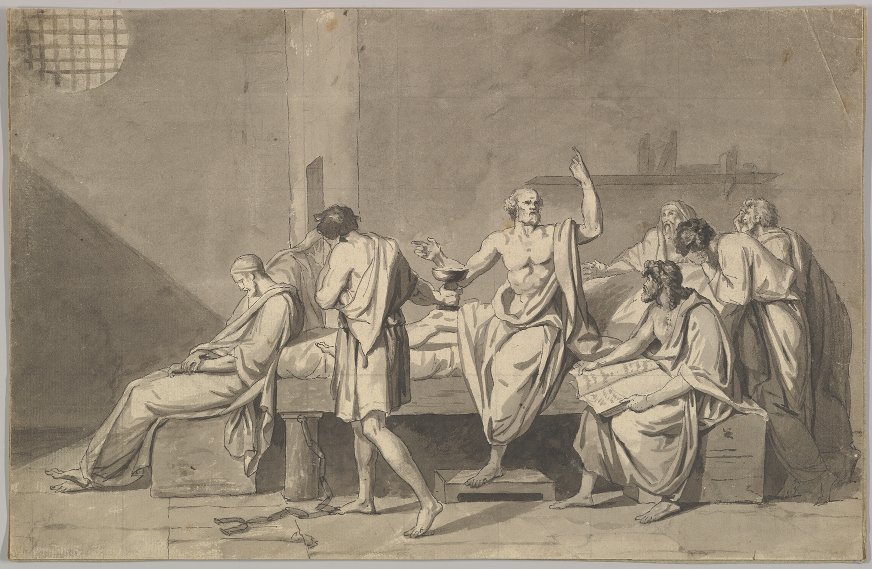Chapter 1 The Examined Life

Jacques-Louis David, “The Death of Socrates”
The unexamined life is not worth living.
—Socrates
Then raising the cup to his lips, quite readily and cheerfully he drank off the poison. Until this point most of us had been able to control our sorrow; but now when we saw him drinking, and saw too that he had finished the draught, we could no longer hold off, and in spite of myself my own tears were flowing fast, so that I covered my face and wept, not for him, but at the thought of my own calamity in having to part from such a friend.2
This is Plato’s version of an eyewitness’ account of the last living moments of their teacher Socrates. Socrates was executed in 399 BCE in his hometown of Athens, Greece in the customary way of being given a cup of poison hemlock extract to drink, for the crimes of “corrupting the youth” and “preaching false gods.” What he really did was spend his days engaging his fellow citizens in dialogue about anything and everything, but especially focused on questions concerning how we all should live our lives, as well as challenging everyone he met to account for and defend their assumptions about how to live. But his relentless questioning earned him many enemies who preferred that the youth, and everybody else, rest content in the assumption that the best way to live is to seek fame and fortune and try to live the “good life” that these seem to make possible. Socrates was not convinced and advocated the life of the philosopher, turning away from worldly pursuits and instead reflecting on and critically examining our deepest assumptions and ultimately being willing to admit how little we really know.
Socrates was famous for his saying that “the unexamined life is not worth living.” What he meant by this is that all of us have a responsibility to examine our own beliefs and try to figure out whether or not they are really true. Not doing this is like sleepwalking through life. This might be pleasant but it runs the risk of us devoting our lives to things that don’t truly matter, and even worse it leads us to neglect developing our unique capacity as human beings. Unlike other animals, we can mentally take a step back from what we see in front of us and ask, “Should I trust what I see or not?” Likewise with everything we do: we can examine our own desires, intentions and plans and ask ourselves, “Should I act on these or not?” In both cases we are capable of distancing ourselves from the immediate demands of our situation and seeking orientation from another source – we seek reasons to believe or doubt what we see and reasons to follow or resist our urges. This reflective capacity is the source of our strength since it has enabled us to understand and manipulate the world around us like no other creature on the planet. But, as we can now see more clearly than perhaps Socrates could, it also puts us in the uniquely awkward position of having to justify ourselves to our own worst critics, ourselves.
Another famous, although fictional figure, who shows the difficulties that our ability to reflect can pose is Shakespeare’s Hamlet. Writing at the dawn of the modern era, which saw the expansion of human populations to the current seven and a half billion of us in the span of a few short centuries, and the resulting crowding out of many other life forms, Shakespeare sums up the human predicament when he has Hamlet say,
What a piece of work is a man! how noble in reason! how infinite in faculties! in form and moving how express and admirable! in action how like an angel! in apprehension how like a god! the beauty of the world, the paragon of animals! And yet to me what is this quintessence of dust?
The capacity to reflect is the source of both our godlike “apprehension” and the difficulties we inevitably encounter in figuring out what we should do with ourselves; our ability to dominate the world we live in and the difficulties we sometimes face in finding a solid sense of purpose and direction. What should we really do with our short time here on this planet and why? Should we live our lives according to the standard routine, and accumulate more and more stuff, seeking one “peak experience” after another to file away in our memories? Or should we look for a higher purpose, whatever that might be? Even though, thankfully, most of us do not experience the tension between these two aspects of our ability to reflect on ourselves and our circumstances quite as dramatically as Hamlet did, all of us face this essentially human predicament – being masters of the universe and yet feeling lost at the same time. As we will be seeing in this text, philosophical ethics is another, much less bloody, way of exploring it. To set the stage for what we will be up to here I want to first say a bit more about our unique reflective capacity and our ability to pay attention to reasons. This was what Socrates had in view when he questioned his fellow Athenians about what they thought was the best way to live. Then I’ll turn to a more detailed account of what is distinctive about philosophy in general and philosophical ethics in particular.
Plato, “Phaedo,” Project Gutenberg, accessed January 12, 2020, https://www.gutenberg.org/files/1658/1658-h/1658-h.htm#link2H_4_0002↩︎